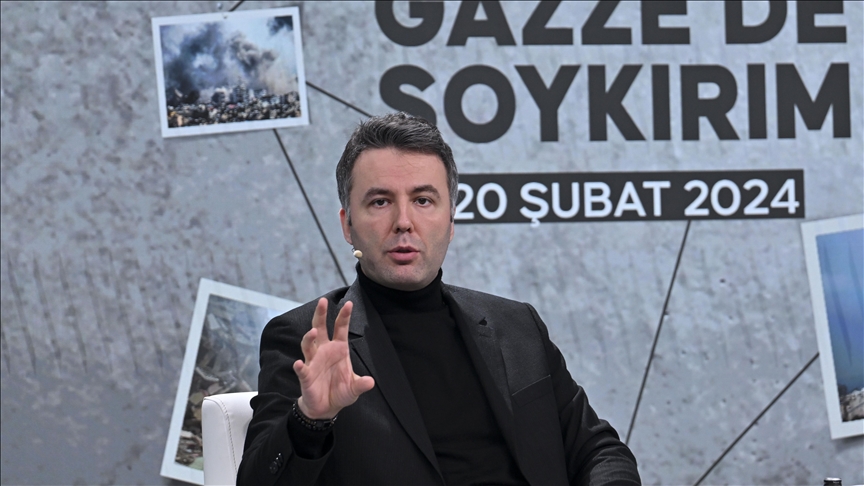Nobody asks Israel what it's doing on Palestinian land: Turkish journalist
This is a 75-year-old issue, it didn't come out of nowhere, says Mehmet Akif Ersoy

ANKARA / ISTANBUL
The whole world seems to be focused on the current conflict in Gaza but nobody asks what Israel has been doing on Palestinian land for the last 75 years, a Turkish journalist said on Tuesday.
Speaking at a panel titled “Genocide in Gaza: New Evidence,” Mehmet Akif Ersoy spoke about censorship in Western media outlets against telling the truth about Gaza.
Everyone is focused on last Oct. 7 as if the whole situation in Gaza started on that date, he said.
“This is a 75-year-old issue between Israel and Palestine,” he stressed. “It didn’t come out of nowhere. It didn’t start on Oct. 7.”
"Nobody asks Israel what it has been doing in someone else’s lands,” he said, referring to the Israeli occupation of Palestinian territories.
He also criticized Western media outlets “for not doing their job while expecting us do to our job,” on Western censorship of the truth about Gaza.
Also speaking at the panel, Hakan Erkiner, who teaches international law at Istanbul’s Marmara University, underlined the importance of collecting evidence against Israel.
“Israel doesn’t weary of killing,” he said.
“That’s why we shouldn’t get tired of collecting evidence. It has to continue,” he advised.
On Al-Mawasi in Gaza, another area Israel has called a “safe space,” he decried Tel Aviv’s plans for the coastal tract, which is to squeeze some 1.4 million Palestinians into a space of 12square kilometers (4.63 square miles), underlining how small the area is for that many people.
Pointing to violations of international law by Israeli authorities, Erkiner said that Israel “intentionally” cuts Palestinians’ access to clean water, toilets, hygienic, health services and medical supplies to make conditions so harsh that local people “will not survive.”
Criticizing Western countries’ stance in the face of genocide, he blamed this on “intellectual regression” as well as a “lack of ethical values.”
Anadolu’s success
Suay Nilhan Acikalin, a foreign policy analyst at Haci Bayram Veli University in the Turkish capital Ankara, stressed the growing number of people who are taking to the streets to protest Israeli actions in Gaza.
“It shows the success of Anadolu, of Türkiye in reflecting the truth,” she told the panel. “Most of the visuals that are being used in street protests come from Anadolu.”
Touching on how Spanish media has worked to speak the truth about Gaza, unlike other Western countries, Acikalin underlined that there has also been a slight change in the attitude of Western officials, including Germany’s, about Gaza.
“Maybe not (Chancellor) Olaf Scholz himself, but some German lawmakers have called on Israel to stop its attacks,” she added.
Turgut Alp Boyraz, Middle East news director at Anadolu, also told the panel about two types of pressure on journalists by Israeli authorities.
“The first is the pressure applied to your company,” he said, referring to Tel Aviv’s efforts to block stories that could hurt their image from being published.
“The second is the fear of being assigned somewhere else when you step on Israeli toes,” he added.
A modern ‘Holocaust’
Mentioning that some of his colleagues “don’t embrace the risk of facing Israeli pressure” and instead try to work under the radar, Boyraz suggested that everyone in this profession “should accept this possibility.”
He added: “99% of Israeli media outlets apply auto-censor themselves.”
On his experience visiting a museum of the Jewish Holocaust, he said: “When you change the names of actors, places, and time in the definition of genocide written in that museum, you see how it 100% fits the situation in Gaza today.”
Boyraz underscored the importance of having documents to prevent the normalization of violence, suggesting there should be “documentaries and books” about the genocide as they did about the Nazi Holocaust, calling this “the Holocaust industry.”
The journalist also criticized the Israeli public’s way of thinking about taking someone else’s lands, calling it “a primitive colonialist perspective.”
Anadolu reporters have extensively documented and publicized possible war crimes committed by Israel against Gaza since last Oct. 7, with pictures by Anadolu photojournalists being used as evidence at the International Court of Justice’s genocide case against Israel.
The images were compiled into a book titled "Evidence" and presented to the public.
Israel launched a deadly offensive on the Gaza Strip following an attack by Hamas on Oct. 7 which killed some 1,200 people. The ensuing Israeli bombardment has killed more than 29,000 people and injured over 69,000 others.
The Israeli war on Gaza has pushed 85% of the territory's population into internal displacement amid acute shortages of food, clean water, and medicine, while 60% of the enclave's infrastructure has been damaged or destroyed, according to the UN.
Israel stands accused of genocide at the International Court of Justice. An interim ruling in January ordered Tel Aviv to stop genocidal acts and take measures to guarantee that humanitarian assistance is provided to civilians in Gaza.
Anadolu Agency website contains only a portion of the news stories offered to subscribers in the AA News Broadcasting System (HAS), and in summarized form. Please contact us for subscription options.







